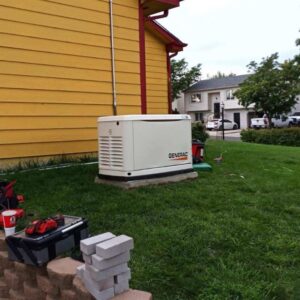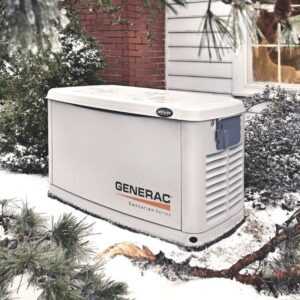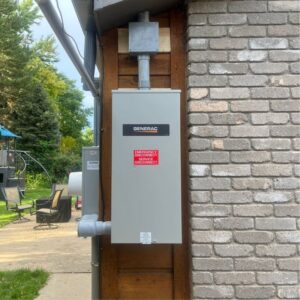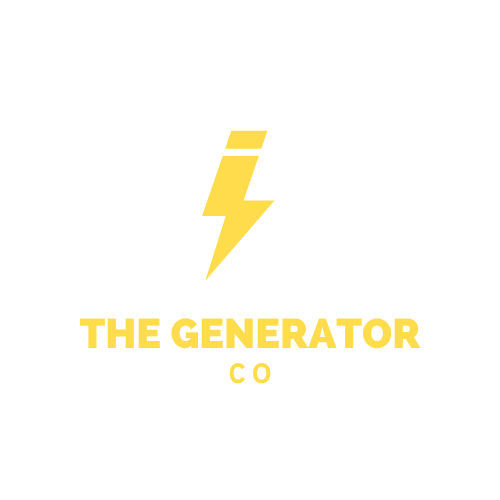How Big of a Generator Do I Need to Run My Whole House?
When the power goes out, everything stops—your lights, Wi-Fi, heating, and even your morning coffee. That’s why more Colorado homeowners are investing in whole home generators that automatically turn on when the grid fails.

But one big question comes up every time: How big of a generator do I need to power my entire home? What size generator do I need?
Let’s break it down so you can choose the right system for your home, your budget, and your peace of mind.
What Is a Whole Home Generator?
A whole home generator—also known as a standby generator or home backup generator—is a permanently installed system designed to power your home automatically during an outage.
Unlike a portable generator, a standby system connects directly to your home’s electrical panel and runs on natural gas, propane, or diesel.
When the power cuts out, it starts automatically within seconds—keeping your lights, refrigerator, HVAC system, and other essentials running smoothly.
For Colorado homeowners, where outages can occur during snowstorms or summer storms, that peace of mind is invaluable.
How Does a Whole Home Generator Work?
Whole home generators are smart systems that constantly monitor your home’s electrical supply. Here’s what happens during an outage:
- Detection: The generator senses when utility power is lost.
- Automatic Start: Within seconds, it signals the engine to start.
- Transfer Switch Activation: The automatic transfer switch (ATS) disconnects your home from the grid and connects it to generator power.
- Steady Power: Your home’s electrical panel receives seamless backup power—no cords or manual restarts needed.
- Return to Normal: When power is restored, the ATS reconnects your home to the grid and powers down the generator.
Think of it as having a personal power plant in your backyard—quiet, reliable, and always ready.
Choosing the Right Generator Size for Your Home
The size of your generator depends on your home’s electrical load, or how much power your appliances and systems draw at once.
Step 1: Calculate Your Total Power Needs
Start by listing the major systems and appliances you want to power:
| Appliance/System | Average Wattage |
|---|---|
| Refrigerator | 700–1,200 W |
| Electric Furnace | 5,000–25,000 W |
| Central Air Conditioner | 3,000–6,000 W |
| Sump Pump | 1,500 W |
| Water Heater | 4,000–5,000 W |
| Lights (whole home) | 1,000–2,000 W |
| Internet/Router | 100 W |
| Misc. Outlets | 500–1,000 W |
Add up the wattage, then divide by 1,000 to convert watts to kilowatts (kW).
The average Colorado home typically needs a 20–25 kW generator to power the entire household comfortably.
If you only want to run essentials—like lighting, the fridge, and the furnace fan—a 10–15 kW model may be enough.
What Size Generator Do Most Colorado Homes Need?
| Home Size | Recommended Generator Size |
|---|---|
| 1,500 sq. ft. | 10–14 kW |
| 2,500 sq. ft. | 16–20 kW |
| 3,500 sq. ft. | 22–25 kW |
| 5,000+ sq. ft. | 25–30+ kW |
Larger homes—or homes with multiple air conditioning units, electric vehicles, or hot tubs—may need a higher-capacity generator or two smaller units connected together.
Fuel Options for Whole Home Generators
You have three main fuel options for home backup generators. Each comes with its pros and cons:
1. Natural Gas
- Pros: Continuous supply, no refueling required
- Cons: Requires a utility connection
- Best for: Urban and suburban Colorado homes with gas service
2. Propane
- Pros: Long shelf life, burns clean
- Cons: Requires a storage tank and regular refills
- Best for: Homes without access to natural gas
3. Diesel
- Pros: High power output, extremely durable
- Cons: Louder operation, more maintenance required
- Best for: Large estates, commercial buildings, or rural properties
Most Colorado homeowners choose natural gas or propane generators for their reliability, clean operation, and efficiency.
How Long Do Whole Home Generators Last?
A high-quality whole home generator can last 20 to 30 years with proper care.

Lifespan depends on several key factors:
- Usage frequency: More outages mean more runtime.
- Maintenance schedule: Regular oil changes, inspections, and filter replacements are essential.
- Fuel type: Natural gas units often last longer than diesel.
- Installation quality: Professional installation ensures safe, efficient operation for years.
When installed and maintained by The Generator CO, your system will be set up for maximum reliability and performance. We work closely with the best generator installers in the Colorado area.
Benefits of Installing a Whole Home Generator
Beyond convenience, a backup generator adds safety and value to your home.
- Automatic power: No need to lift a finger during an outage.
- Protects your property: Prevents frozen pipes, spoiled food, and system damage.
- Increases resale value: Homes with standby power are more attractive to buyers.
- Supports energy independence: Stay comfortable even when the grid goes down.
Why Choose The Generator CO
At The Generator CO, we specialize in generator installations, repairs, and maintenance across Colorado. Our team is certified to install and service Generac, Kohler, and other leading brands.
We handle every detail—from load calculations and permitting to installation and long-term upkeep. Whether you’re in Denver, Colorado Springs, or anywhere along the Front Range, we’ll ensure your generator is perfectly matched to your home’s needs.
When you choose The Generator CO, you get:
- Licensed and insured Colorado technicians
- Expert sizing and fuel source recommendations
- Hassle-free installation with clean, professional workmanship
- Reliable annual maintenance and 24/7 support
Read our guide for whole-house generator installation in Colorado.
FAQs About Whole Home Generators

What size generator do I need for a 2,000 sq. ft. home?
Most 2,000 sq. ft. homes in Colorado require a 16–20 kW generator to power heating, lighting, and major appliances.
Can a whole home generator power air conditioning and heating?
Yes—if it’s properly sized, your generator can handle your central air system and furnace fan at the same time.
How often should I service my generator?
Schedule annual maintenance or every 200 hours of use to keep your system in top condition.
Can I install a generator myself?
DIY installation can be dangerous and may void your warranty. Professional installation ensures safe wiring, code compliance, and reliability.
How much does a whole home generator cost?
In Colorado, installed systems typically range from $7,000–$15,000, depending on size and brand.
Final Thoughts
Choosing the right generator means understanding your home’s energy needs and preparing for the unexpected. Whether it’s a blizzard, wildfire season, or grid failure, a whole home generator keeps your home powered, safe, and comfortable.
If you want expert guidance and professional installation, The Generator CO is here to help. We’ll calculate your electrical load, recommend the right system, and handle every step of the process—so your power never skips a beat.
Schedule a Free Estimate
Keep your home powered no matter what Colorado’s weather brings.
Contact The Generator CO today to schedule your free whole home generator estimate.
October 29, 2025
